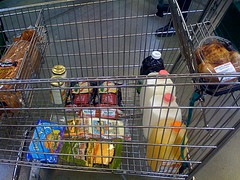 Food just keeps getting more and more expensive every time we turn around. If you are like me you are looking for just about any way you can find to stretch your food budget, save money, and eliminate waste on the food you buy. It gets harder and harder by the day to watch good, expensive food go to waste in the refrigerator because you are not able to eat it fast enough.
Food just keeps getting more and more expensive every time we turn around. If you are like me you are looking for just about any way you can find to stretch your food budget, save money, and eliminate waste on the food you buy. It gets harder and harder by the day to watch good, expensive food go to waste in the refrigerator because you are not able to eat it fast enough.
These tips will help you get the most out of your food budget, and ensure that you have a chance to eat the food you worked so hard to bring into the house.
1) Careful Planning and Shopping for Shorter Periods – Most of the time frugal sites tell you to shop 2 weeks or a month at a time. While this keeps you out of the store more, and conceivably keeps you from spending as much money, you might want to take a look at how you buy and how much food you are wasting to see if this is so. If food is going to waste, then you are not saving much money by going longer between trips. It really all depends on what type of food you are buying. Fresh foods won’t make it 2 weeks under normal circumstances and should be purchased more frequently. The bottom line is make sure you are only purchasing what you can eat before it goes bad.
2) Go Ahead and Buy in Bulk but Consider How You will Store it – If you plan to buy in bulk and save money, then think ahead and decide what you will use the extra food for. Be prepared to have freezer space to freeze the extra, or to cook extra meals ahead of time and freeze them. Keep in mind that bulk meats will only last 3 to 5 days in the fridge before they have to be tossed, so if you do not have time today or tomorrow to take care of that extra meat you got on sale, leave it in the store.
3) Salvaging Less than Pretty Vegetables – If you fill your crisper full of vegetables then you must be prepared to eat them all before they go bad. They will last a few days in the fridge, but then they will start to wilt and go soft. While you cannot recoup the lost nutrition from vegetables you bought and did not use in time, you can perk them up and make them look pretty again so that you can at least use them up and not let them go to waste. For green vegetables that have not spoiled, simply put them in a pan of simmering water and add a teaspoon or two of baking soda to the water. The greens will brighten up, thanks to the baking soda’s alkaline content, making them look green again. This works for green vegetables such as broccoli, green beans, and snow peas.
Even better if you cannot eat them all, blanch them and toss them in the freezer. Or toss them in a pot of soup, either way you will use up food and not let it go to waste.
4) Prepare Food to be Used as Leftovers Right Away – if you put a whole chicken with a few slices out of it back in the fridge you will not be as likely to use it up. Instead, cut up the chicken the same day. Dice up bits of chicken and put in the freezer for soup or casseroles, slice pieces of chicken breast for sandwiches, and boil the carcass the next day to use for chicken stock or soup.
 5) Make Strawberries Last Longer – Strawberries tend to go bad quickly, so anything you can do to extend their life, can make them a much better investment at the checkout stand. Clean strawberries as soon as you bring them home, trim the stems off and let them sit out to air dry. Once they are dry, store them in a Ziploc baggie, doing this will ensure that they last twice as long or more. Removing them from the pint container gives them more air flow, and removing stems stops the ripening process.
5) Make Strawberries Last Longer – Strawberries tend to go bad quickly, so anything you can do to extend their life, can make them a much better investment at the checkout stand. Clean strawberries as soon as you bring them home, trim the stems off and let them sit out to air dry. Once they are dry, store them in a Ziploc baggie, doing this will ensure that they last twice as long or more. Removing them from the pint container gives them more air flow, and removing stems stops the ripening process.
6) Keep Cheese Fresh Longer – Most of us put cheese in a Ziploc baggie the minute we take it out of the package but this is the worst thing you can do. Instead of putting cheese in plastic which will suffocate it and cause it to get moldy faster, wrap it in cheese paper or wax paper, which allows it to breath much better.
7) Find Uses for Food That is No Longer Good for its Original Use – Food may not seem edible once it is past its prime, but many times it is still just fine. This is where you need to find other uses for those foods. Leftover vegetables can go in soups, stews and other dishes. Stale bread that is no longer good for sandwiches can be made into French toast or cut up for croutons. You can also let it go completely stale and turn it into bread crumbs.
8) Have a Hard time Using Up Garlic? – Garlic cloves will go bad fairly quickly if you leave them sitting around. Rather than have them sprout or spoil, peel your garlic and store them in the freeze covered with olive oil. Not only will you have fresh garlic but you will have garlic infused oil to use in your dishes.
9) Don’t let Onions, Peppers, and Celery Go Bad – If you do not use a lot of these or find it much more economical to buy in bulk, then do not let them go to waste. Each of these can be diced up, flash frozen and placed in plastic bags in the freezer. Take out what you need for soups, sautés, or casseroles, and put the rest back in the freezer until you need it.
10) Save those herbs – How many times have you paid good money to buy herbs for a special meal, only used a small amount of the herbs and watched the rest go bad? Dice the herbs up into portion sizes and put them in ice cup trays. Pour water over the herbs and freeze. The next time you need that herb, pull a single ice cube out of the freezer and toss it in your food, it is that easy.




